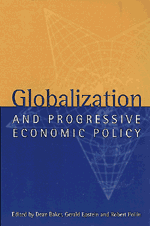Book contents
- Frontmatter
- Contents
- List of figures
- List of tables
- List of contributors
- Editors' acknowledgments
- 1 Introduction
- I The IMF, the World Bank, and neo-liberalism
- 2 The revival of the liberal creed: the IMF, the World Bank, and inequality in a globalized economy
- Comment by Arthur MacEwan
- 3 India: dirigisme, structural adjustment, and the radical alternative
- Comment by Keith Griffin
- II Foreign direct investment, globalization, and neo-liberalism
- III Globalization of finance
- IV Trade, wages and the environment: North and South
- V Migration of people in a global economy
- VI Globalization and macroeconomic policy
- Bibliography
- Index
Comment by Arthur MacEwan
Published online by Cambridge University Press: 04 August 2010
- Frontmatter
- Contents
- List of figures
- List of tables
- List of contributors
- Editors' acknowledgments
- 1 Introduction
- I The IMF, the World Bank, and neo-liberalism
- 2 The revival of the liberal creed: the IMF, the World Bank, and inequality in a globalized economy
- Comment by Arthur MacEwan
- 3 India: dirigisme, structural adjustment, and the radical alternative
- Comment by Keith Griffin
- II Foreign direct investment, globalization, and neo-liberalism
- III Globalization of finance
- IV Trade, wages and the environment: North and South
- V Migration of people in a global economy
- VI Globalization and macroeconomic policy
- Bibliography
- Index
Summary
Considering the logic of World Bank and IMF policy makers, one wonders how long it will be until they require that countries receiving their largess abolish laws against slavery. Clearly such social interference with the market reduces efficiency. Consider, for example, the lack of investment in training in many poor countries. If employers could own their workers and thus be sure of attaining the full returns from their training expenditures, surely they would invest more in training programs.
A similar logic, after all, has guided neo-liberal thinking about the environment and land use. In the case of the environment, dumping hazardous waste in poor countries is justified by the low economic value of life and by the claim that a clean environment is a luxury good. With land, from Mexico to Papua New Guinea, Bretton Woods thinking demands that systems of communal land holding give way to private individual plots; this commodification of nature is then supposed to generate economic efficiency and growth.
Argument by reductio ad absurdum is seldom fair, but it does help here to make a point. If the generators of ideology at the World Bank and the IMF will not recognize that their advice on the environment, land, and the general role of markets must be viewed in the context of larger social values and social arrangements, perhaps the specter of slavery will at least make them squirm in their seats – if not revise their policy prescriptions.
- Type
- Chapter
- Information
- Globalization and Progressive Economic Policy , pp. 64 - 66Publisher: Cambridge University PressPrint publication year: 1998
- 1
- Cited by

